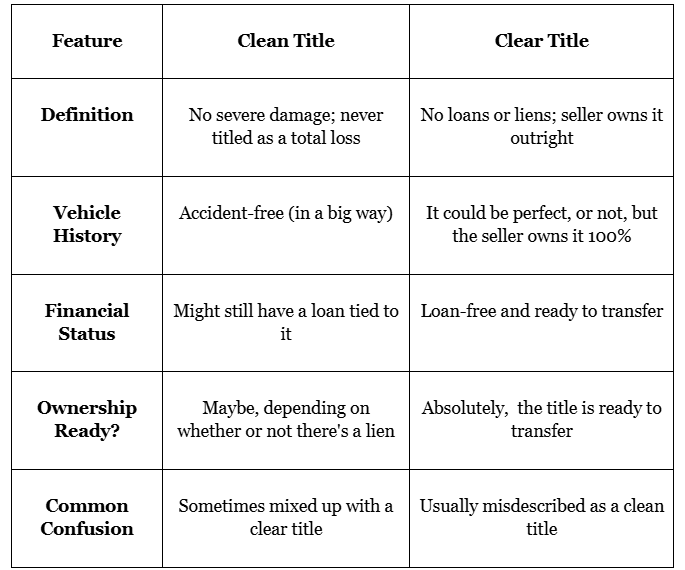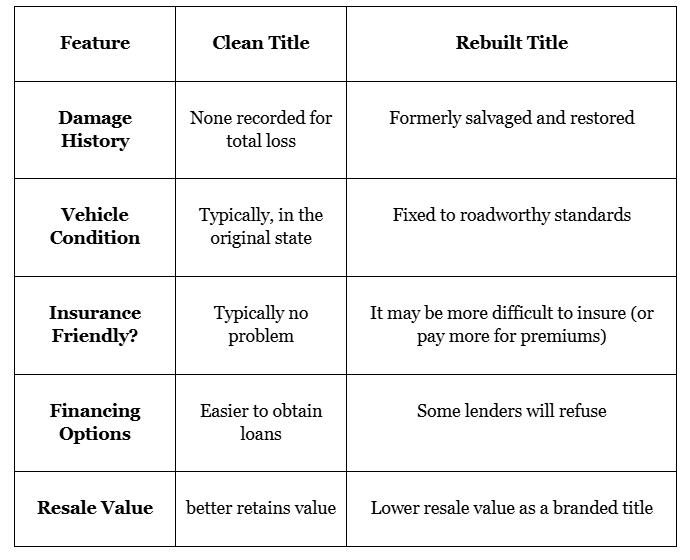You’ve found a car that seems like a complete bargain, low price, good pictures, and exactly what you want. Then you get slammed by a bunch of baffling jargon: clean title, clear title, salvage title, rebuilt title vs clean title. And you’re no longer sure anymore.
What do they all mean? And most importantly, which one can you believe?
These title classifications aren’t mere technicalities; they’re the real history of any used car, from dealership lots to online auction sites such as Salvage Reseller. Disregard them, and you might just get yourself a big headache.
But don’t worry, we’ll explain everything in simple terms. Regardless of your level of experience, this guide will help you make safer, more informed, and more economical decisions.
What Is a Car Title, Anyway?
Before we dive into clean vs. clear vs. salvage vs. rebuilt, let’s cover the fundamentals.
A car title is a formal document from your state’s DMV. It establishes who owns the vehicle and contains important information such as:
- The owner’s name
- The VIN (Vehicle Identification Number)
- The make, model, and year
- The odometer reading
- And most importantly: the title status
The title status reveals to you the type of history the vehicle has: has it been wrecked, fixed, or does it still have finance on it? And that’s where the fun begins.
Clean Title vs. Clear Title: What’s the Difference?
Here is where everyone gets lost. Clean title and clear title are very close, sounding itchy, and, actually, they are similar in meaning, often being used as synonyms, but they are not synonyms.
Let’s put it all out in a side-by-side comparison:
Clean Title vs. Clear Title: Quick Comparison
In plain language:
A clean title is used to refer to the fact that the car has not been written off or seriously damaged.
Free and clear means that there are no liens, no loans, no bank, nothing on the home page; a clear title is a pure title.
A car might have a clean title but not a clear title if the owner still owes cash on it. And that becomes important when the time comes to sell it.
So What’s a Salvage Title, Then?
If a clean title is the gold standard, a salvage title is the red flag, but not always in a negative sense.
A salvage title is given when a vehicle is severely damaged, so severely that an insurance company determines it is not worth repairing. This can occur as a result of:
- Serious accidents
- Flood damage
- Theft recovery
- Fire damage
It doesn’t necessarily mean the car is worthless. It just means repairing it was more expensive than it was worth then.
Here’s the best part: a salvage title vehicle can be a treasure trove if you understand how to work it. Lots of consumers purchase these cars at auction from sites such as Salvage Reseller, refurbish them, and drive them or sell them for a profit.
What Is a Rebuilt Title, Then?
After a salvage title vehicle is repaired and inspected, the DMV may issue a rebuilt title.
Which means:
- The vehicle was previously deemed to be a total loss.
- It’s been repaired and is once again legal to drive.
- The history remains on the record, but the vehicle is safe to drive.
View it as a comeback story. The vehicle had a difficult time but survived.
Rebuilt Title vs. Clean Title: Key Differences
Here’s a quick comparison of how rebuilt titles compare to clean titles:
So, Which One Should You Choose?
Here’s the reality: it matters about your objectives.
Opt for a Clean & Clear Title Car when:
- You desire peace of mind.
- You don’t like surprises.
- You prefer simple insurance and resale.
- You’re purchasing a car for everyday driving or for your family.
Opt for a Rebuilt or Salvage Title Car when:
- You’re handy or have a trusted mechanic.
- You’re on a budget and desire the best bang for your buck.
- You’re fine with making some repairs (or already intend to).
- You’re considering auctions from Salvage Reseller as a good bargain.
Just be sure to enter with your eyes open. Not all salvage vehicles are worth it, and not all clean title vehicles are perfect.
Must-Know Tips Before You Buy
Regardless of which title type you’re considering, here are some important steps to safeguard yourself:
- Inspect the Title Type.
Don’t take anything for granted; check the title status on the ad or ask the seller directly.
- Do a Vehicle History Report.
Take the VIN and obtain an in-depth history through Carfax, AutoCheck, or an equivalent service.
- Request Photos or an Inspection.
Particularly if purchasing online. Most auction sites (such as Salvage Reseller) provide high-res photos and inspection reports.
- Familiarize Yourself with Your State Laws.
Each state has varying regulations on salvage and rebuilt titles. Some have additional inspections or documentation.
- Budget for Insurance and Repairs.
Rebuilt or salvage vehicles are sometimes bargains initially, but will cost more over time. Think ahead.
Frequently Asked Questions (FAQ)
- What is the key difference between a rebuilt title and a clean title?
A clean title means no major total loss history, while a rebuilt title indicates a previously salvaged car that’s been repaired, inspected, and deemed roadworthy again.
- Is it worth buying a salvage title car from an auction site?
A salvage title car can be worth it if you understand repair costs, review inspection details, and accept potential insurance or financing limitations before purchase.
- Can a vehicle have a clean title but not a clear title?
Yes, a car may have a clean title with no total loss history, but still carry outstanding loans or liens preventing immediate ownership transfer.
- How do insurance companies treat a rebuilt title vs a clean title vehicle?
Insurance is generally easier and cheaper with clean titles, while rebuilt title cars may have higher premiums or limited coverage due to higher risk factors.
- Why are salvage title cars usually cheaper than clean title vehicles?
They cost less because of prior damage, reduced resale value, and potential insurance challenges. Buyers trade peace of mind for upfront savings and repair opportunities.
Final Thoughts
You have now realised that car titles are not just about paperwork; they are an entry to the past of a vehicle.
A clean title can look flawless on the surface. A clear title provides you with peace of mind as a homeowner. A salvage title vehicle may be a gem in the rough. And a rebuilt title? That’s a rags-to-riches story with some serious potential.
Knowing the difference between a rebuilt title and a clean title is ahead of the game and saves you costly blunders. It’s simply about finding the right title for your needs, your budget, and your risk tolerance.
And you may start bidding with confidence at Salvage Reseller when you’re prepared to look for your next car, whether it’s clean, clear, or a fixer-upper.




